
beeai-platform
Discover, run, and compose AI agents from any framework.
Stars: 766
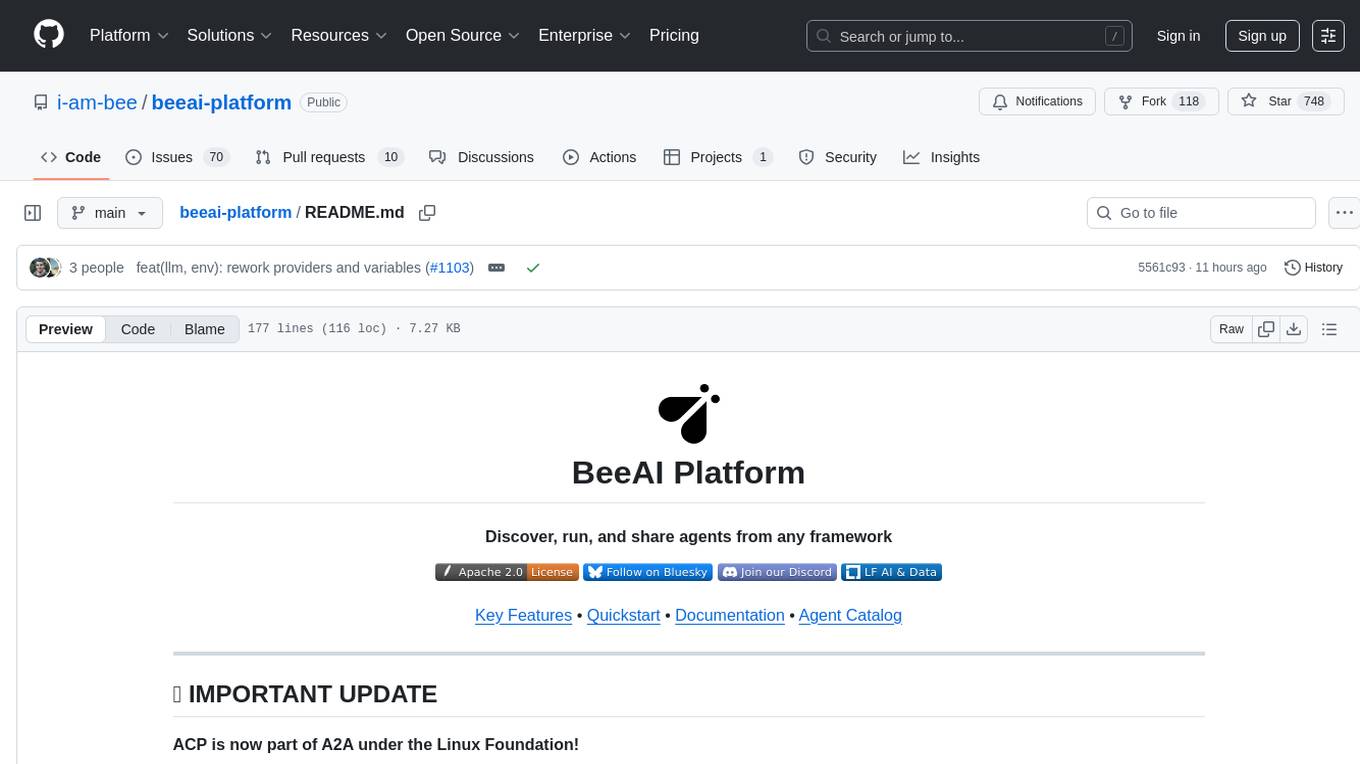
BeeAI is an open-source platform that simplifies the discovery, running, and sharing of AI agents across different frameworks. It addresses challenges such as framework fragmentation, deployment complexity, and discovery issues by providing a standardized platform for individuals and teams to access agents easily. With features like a centralized agent catalog, framework-agnostic interfaces, containerized agents, and consistent user experiences, BeeAI aims to streamline the process of working with AI agents for both developers and teams.
README:
Key Features • Quickstart • Documentation • Agent Catalog
ACP is now part of A2A under the Linux Foundation!
👉 Learn more | 🛠️ Migration Guide
BeeAI is an open-source platform that makes it easy to discover, run, and share AI agents across frameworks. Built on the Agent2Agent (A2A) Protocol and hosted by the Linux Foundation, BeeAI bridges the gap between different agent ecosystems.
Teams trying to operationalize AI agents face three critical challenges:
- Framework Fragmentation: Different agent frameworks create silos and duplicated efforts
- Deployment Complexity: Each agent requires its own setup, limiting scalability
- Discovery Challenges: No central hub exists for finding and using available agents
BeeAI provides a standardized platform to discover, run, and share agents from any framework - for both individuals and teams.
BeeAI makes it easy to experiment with agent capabilities on your own machine:
- 🧪 Try agents instantly from the community catalog without complex setup
- 📦 Use standard interfaces that create consistent user experiences
- 🛠️ Package existing agents from any framework using standardized containers
- 🌍 Share agents with others through a consistent web interface
As you scale from personal experimentation to team adoption, BeeAI grows with you:
- 🌐 Deploy a centralized BeeAI instance that the entire team can access
- 📚 Create a team catalog where developers publish and end users discover agents
- 🧰 Standardize agent interfaces for consistent user experiences
- 🔐 Centrally manage LLM connections to control costs and access
| Feature | How It Works | Business Value |
|---|---|---|
| Agent Catalog | One BeeAI platform serves your entire team | Everyone works from the same system with unified management |
| Framework Agnostic | BeeAI implements the Agent2Agent (A2A) Protocol to standardize agent interfaces regardless of how they're built | Developers use their preferred tools while maintaining compatibility |
| Containerized Agents | Each agent runs in its own container with defined resource limits | Better performance, improved security, and efficient resource usage |
| Consistent Interfaces | Predictable agent interactions | Learn once, use everywhere |
| Agent Discovery | All agents appear in a searchable catalog with capability details | End users easily find agents and developers see usage patterns |
| LLM Provider Flexibility | Connect to any LLM provider | Use the best model for each task and easily switch providers |
[!TIP] This is the short version. See the installation guide for detailed instructions.
uv tool install beeai-cli- Start the BeeAI platform:
beeai platform start- Configure the LLM provider:
beeai model setup- Use the CLI:
# List all available agents
beeai list
# Run an agent interactively
beeai run chat
# Run an agent with direct input
beeai run chat "Hello! How are you?"
# Get agent details and parameters
beeai info chat
# View all CLI options
beeai --help- Launch the web interface:
beeai ui[!NOTE] The web UI is intentionally simplified for end-users who need basic agent interactions without CLI complexity. Think of the web UI as a deployment target for your agents, not your primary development environment.
Visit docs.beeai.dev for full documentation.
Visit beeai.dev/agents for the list of reference agent implementations.
The BeeAI community is active on GitHub Discussions where you can ask questions, voice ideas, and share your projects.
To chat with other community members, you can join the BeeAI Discord server.
Please note that our Code of Conduct applies to all BeeAI community channels. We strongly encourage you to read and follow it.
For information about maintainers, see MAINTAINERS.md.
Contributions to BeeAI are always welcome and greatly appreciated. Before contributing, please review our Contribution Guidelines to ensure a smooth experience.
Special thanks to our contributors for helping us improve BeeAI.
Special thanks to the following outstanding projects for their inspiration and influence:
Developed by contributors to the BeeAI project, this initiative is part of the Linux Foundation AI & Data program. Its development follows open, collaborative, and community-driven practices.
For Tasks:
Click tags to check more tools for each tasksFor Jobs:
Alternative AI tools for beeai-platform
Similar Open Source Tools

beeai-platform
BeeAI is an open-source platform that simplifies the discovery, running, and sharing of AI agents across different frameworks. It addresses challenges such as framework fragmentation, deployment complexity, and discovery issues by providing a standardized platform for individuals and teams to access agents easily. With features like a centralized agent catalog, framework-agnostic interfaces, containerized agents, and consistent user experiences, BeeAI aims to streamline the process of working with AI agents for both developers and teams.
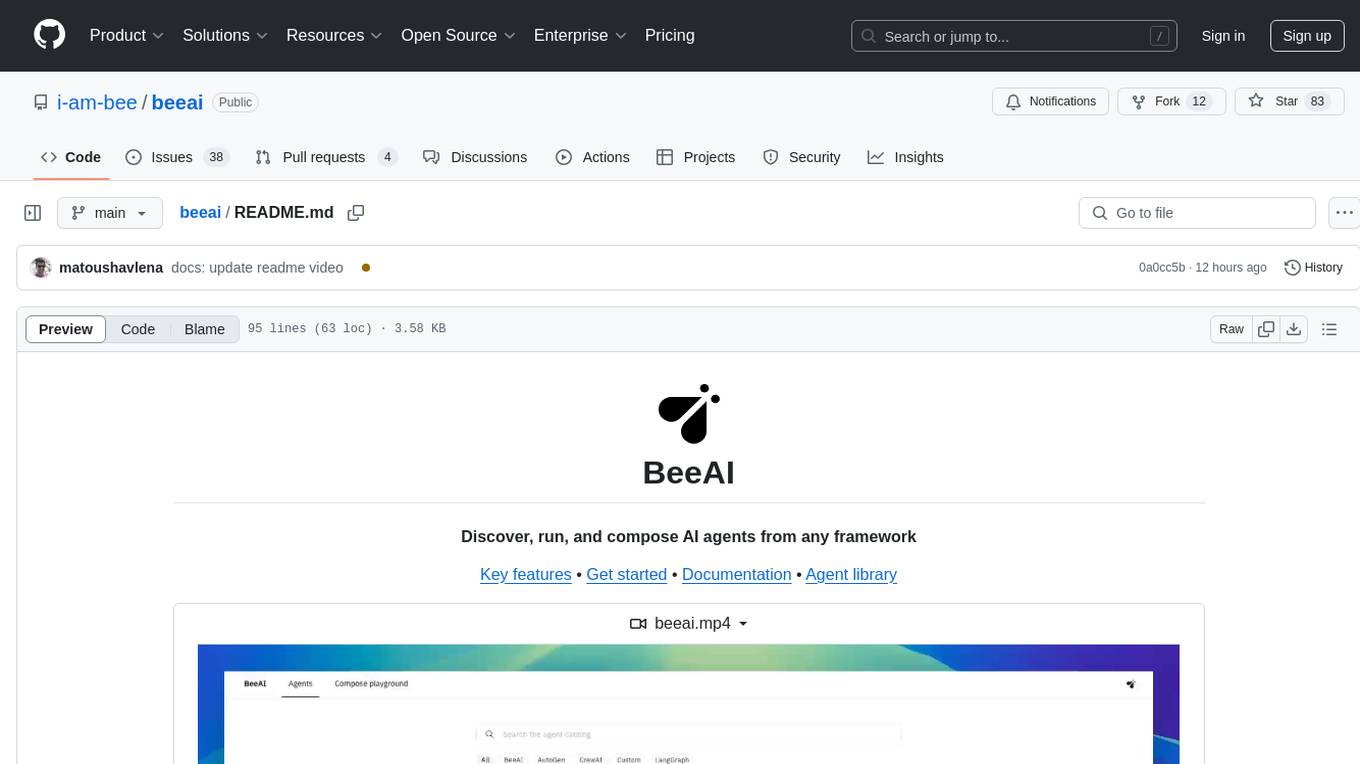
beeai
BeeAI is an open platform that helps users discover, run, and compose AI agents from any framework and language. It offers a framework-agnostic approach, allowing seamless integration of AI agents regardless of the language or platform. Users can build complex workflows using simple building blocks, explore a catalog of powerful agents with integrated search, and benefit from the BeeAI ecosystem with first-class support for Python and TypeScript agent developers.

AgentForge
AgentForge is a low-code framework tailored for the rapid development, testing, and iteration of AI-powered autonomous agents and Cognitive Architectures. It is compatible with a range of LLM models and offers flexibility to run different models for different agents based on specific needs. The framework is designed for seamless extensibility and database-flexibility, making it an ideal playground for various AI projects. AgentForge is a beta-testing ground and future-proof hub for crafting intelligent, model-agnostic autonomous agents.
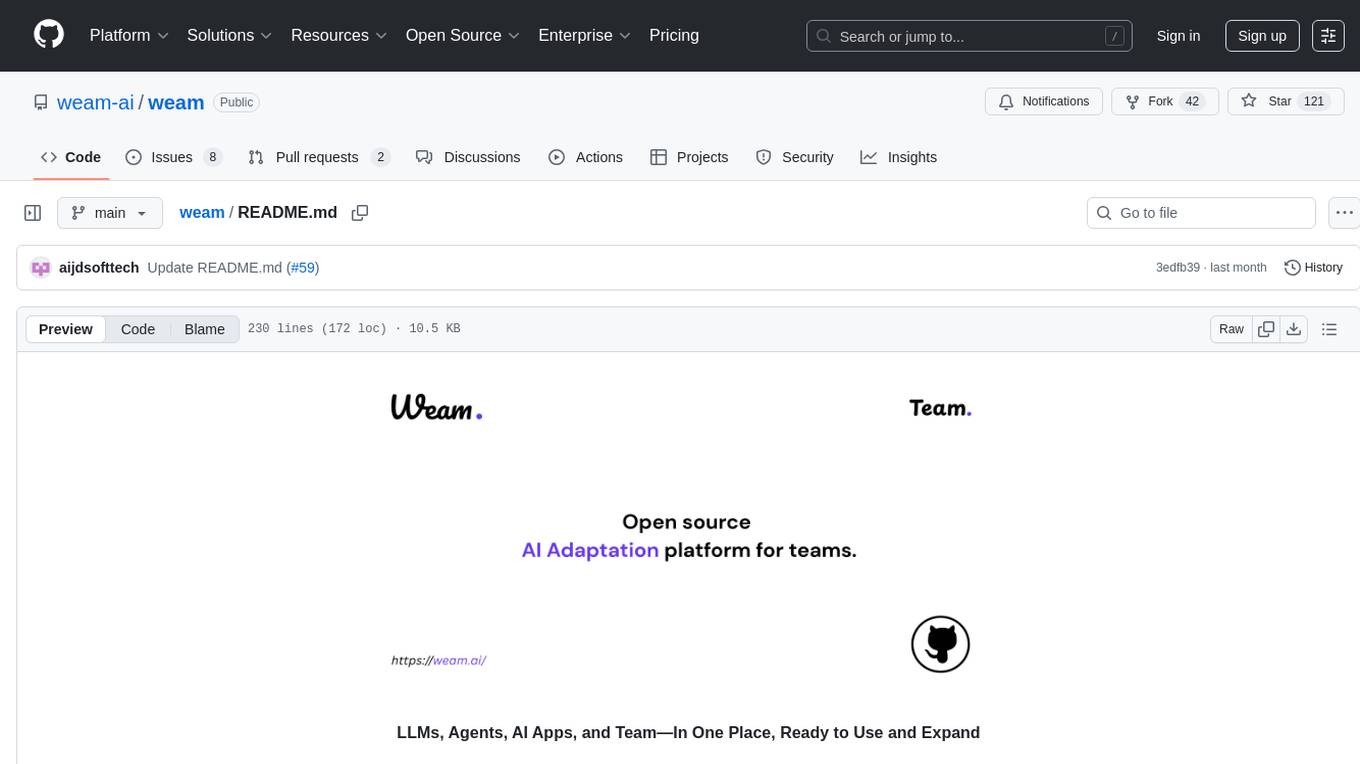
weam
Weam is an open source platform designed to help teams systematically adopt AI. It provides a production-ready stack with Next.js frontend and Node.js/Python backend, allowing for immediate deployment and use. Weam connects to major LLM providers, enabling easy access to the latest AI models. The platform organizes AI interactions into 'Brains' for different departments, offering customization and expansion options. Features include chat system, productivity tools, sharing & access controls, prompt library, AI agents, RAG, MCP, enterprise features, pre-built automations, and upcoming AI app solutions. Weam is free, open source, and scalable to meet growing needs.
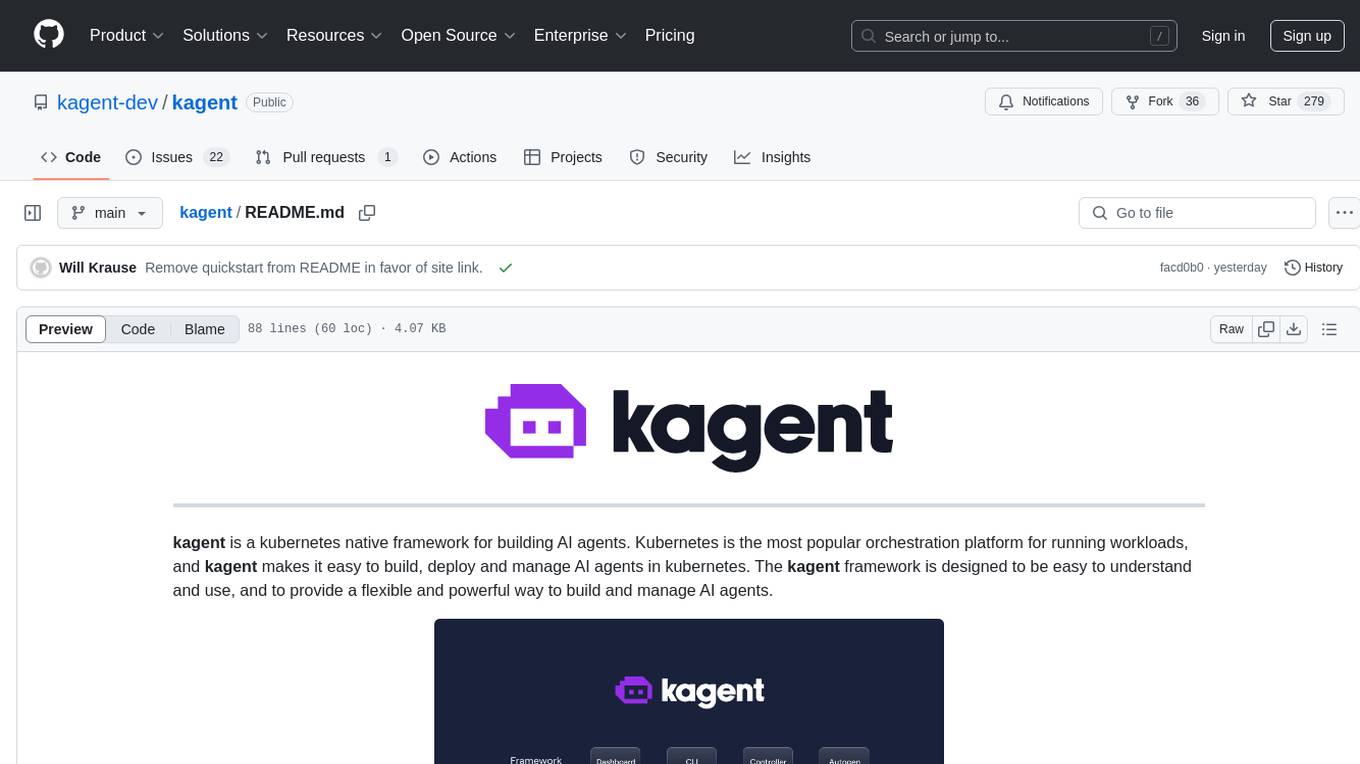
kagent
Kagent is a Kubernetes native framework for building AI agents, designed to be easy to understand and use. It provides a flexible and powerful way to build, deploy, and manage AI agents in Kubernetes. The framework consists of agents, tools, and model configurations defined as Kubernetes custom resources, making them easy to manage and modify. Kagent is extensible, flexible, observable, declarative, testable, and has core components like a controller, UI, engine, and CLI.
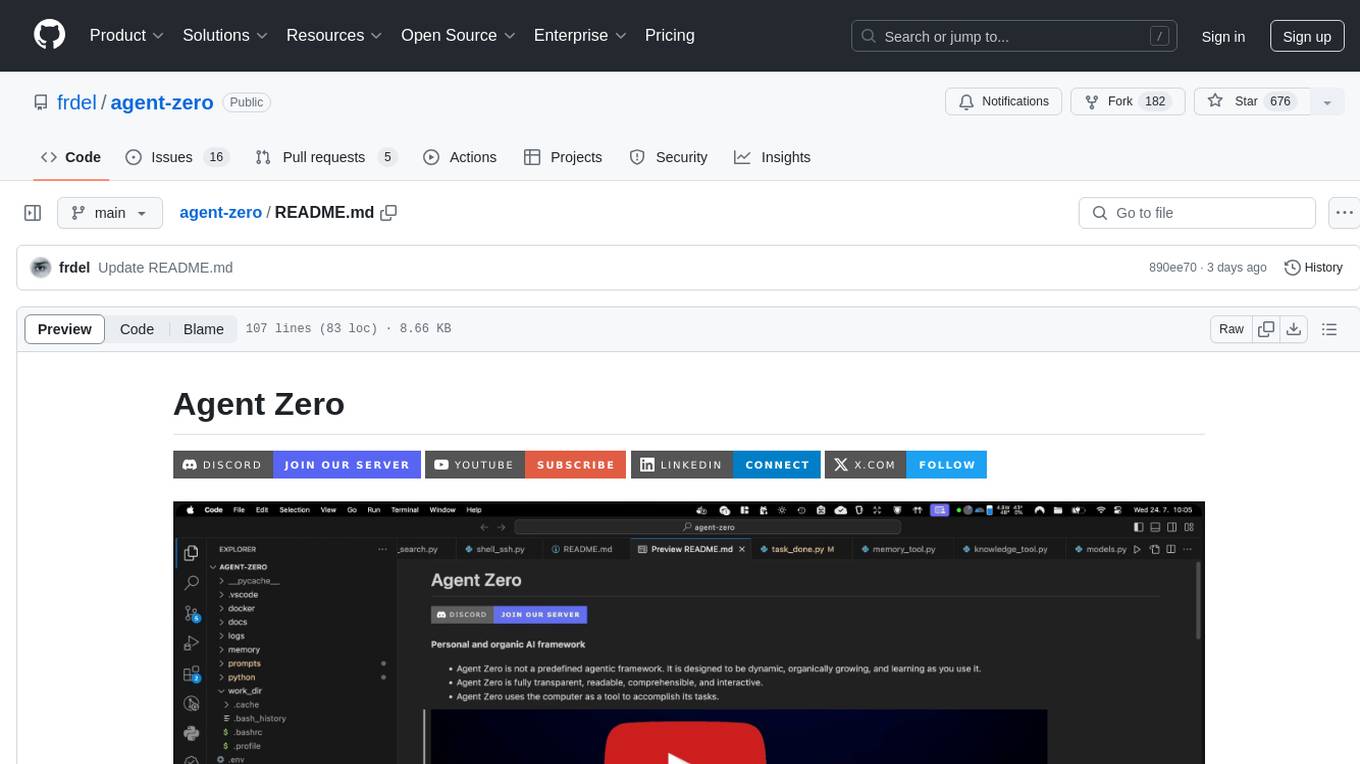
agent-zero
Agent Zero is a personal and organic AI framework designed to be dynamic, organically growing, and learning as you use it. It is fully transparent, readable, comprehensible, customizable, and interactive. The framework uses the computer as a tool to accomplish tasks, with no single-purpose tools pre-programmed. It emphasizes multi-agent cooperation, complete customization, and extensibility. Communication is key in this framework, allowing users to give proper system prompts and instructions to achieve desired outcomes. Agent Zero is capable of dangerous actions and should be run in an isolated environment. The framework is prompt-based, highly customizable, and requires a specific environment to run effectively.

TaskingAI
TaskingAI brings Firebase's simplicity to **AI-native app development**. The platform enables the creation of GPTs-like multi-tenant applications using a wide range of LLMs from various providers. It features distinct, modular functions such as Inference, Retrieval, Assistant, and Tool, seamlessly integrated to enhance the development process. TaskingAI’s cohesive design ensures an efficient, intelligent, and user-friendly experience in AI application development.
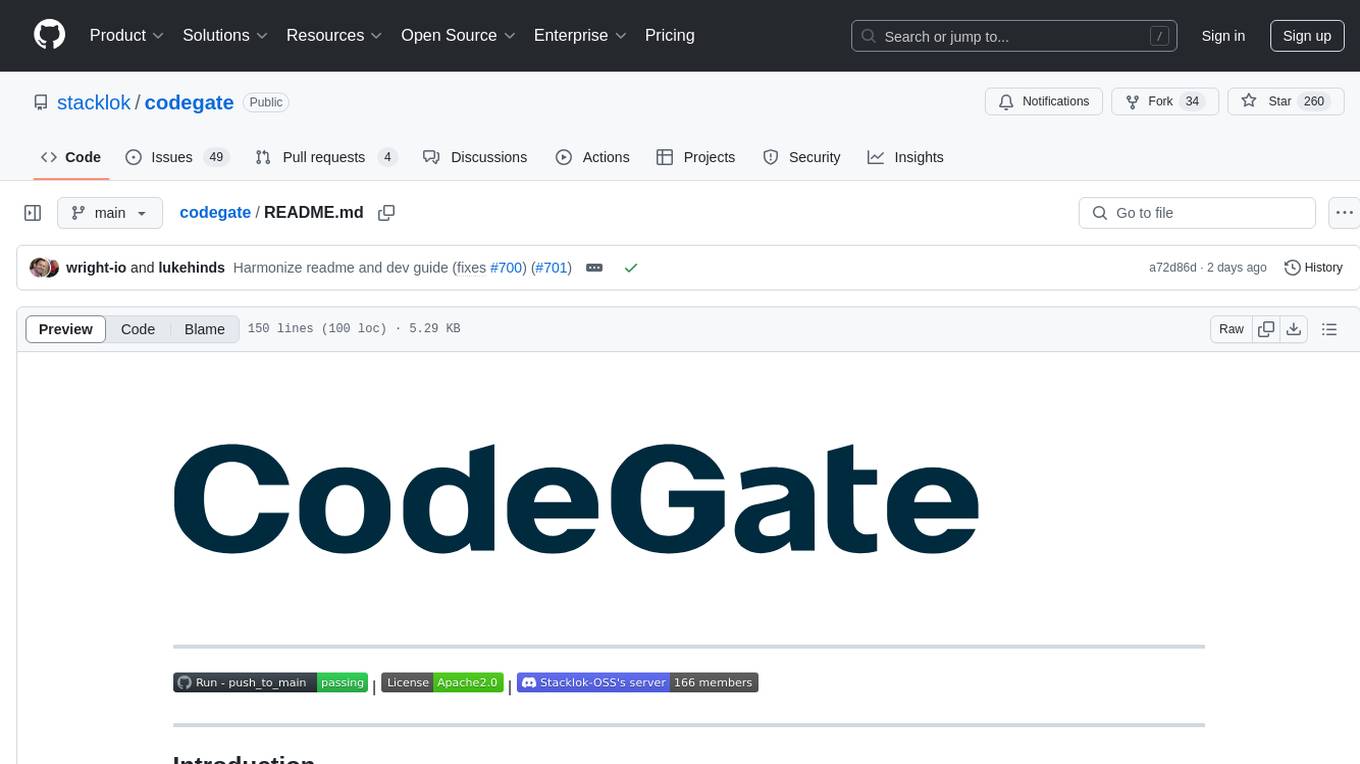
codegate
CodeGate is a local gateway that enhances the safety of AI coding assistants by ensuring AI-generated recommendations adhere to best practices, safeguarding code integrity, and protecting individual privacy. Developed by Stacklok, CodeGate allows users to confidently leverage AI in their development workflow without compromising security or productivity. It works seamlessly with coding assistants, providing real-time security analysis of AI suggestions. CodeGate is designed with privacy at its core, keeping all data on the user's machine and offering complete control over data.
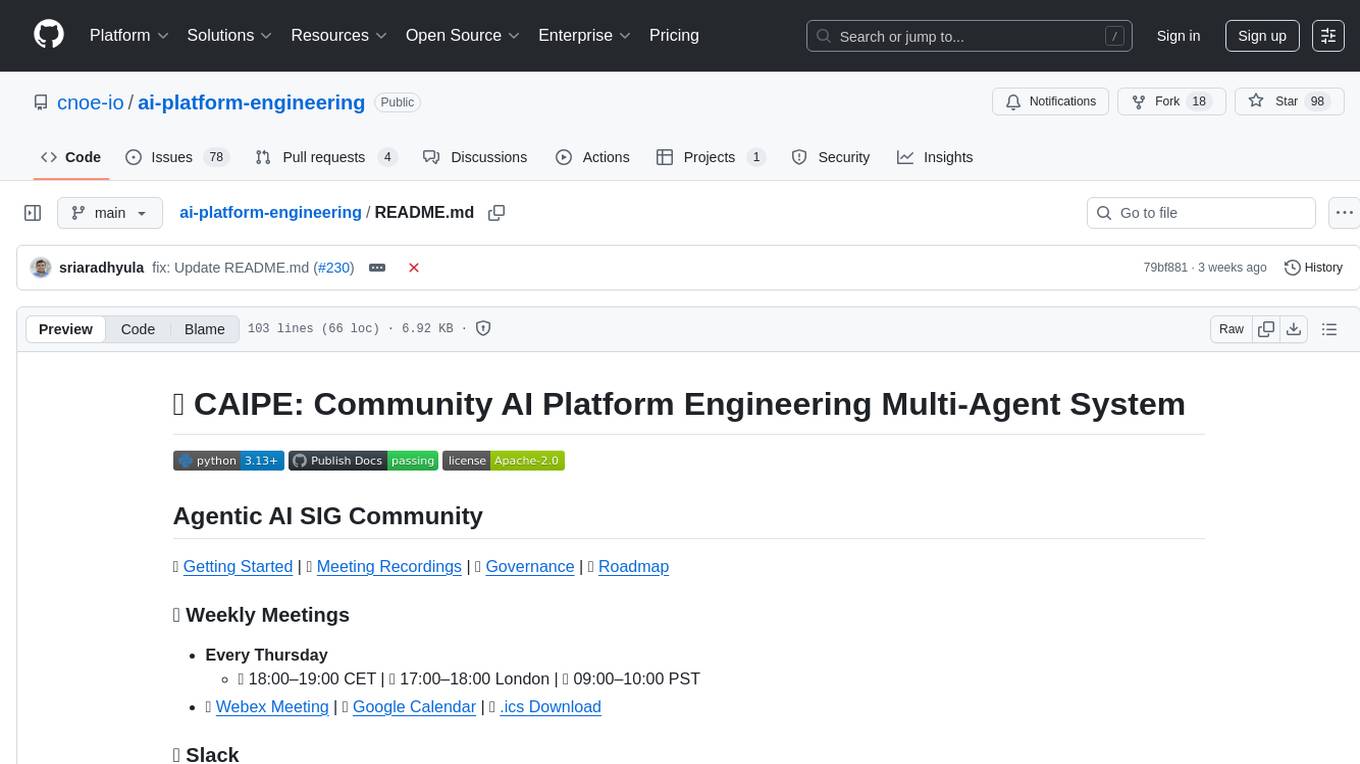
ai-platform-engineering
The AI Platform Engineering repository provides a collection of tools and resources for building and deploying AI models. It includes libraries for data preprocessing, model training, and model serving. The repository also contains example code and tutorials to help users get started with AI development. Whether you are a beginner or an experienced AI engineer, this repository offers valuable insights and best practices to streamline your AI projects.
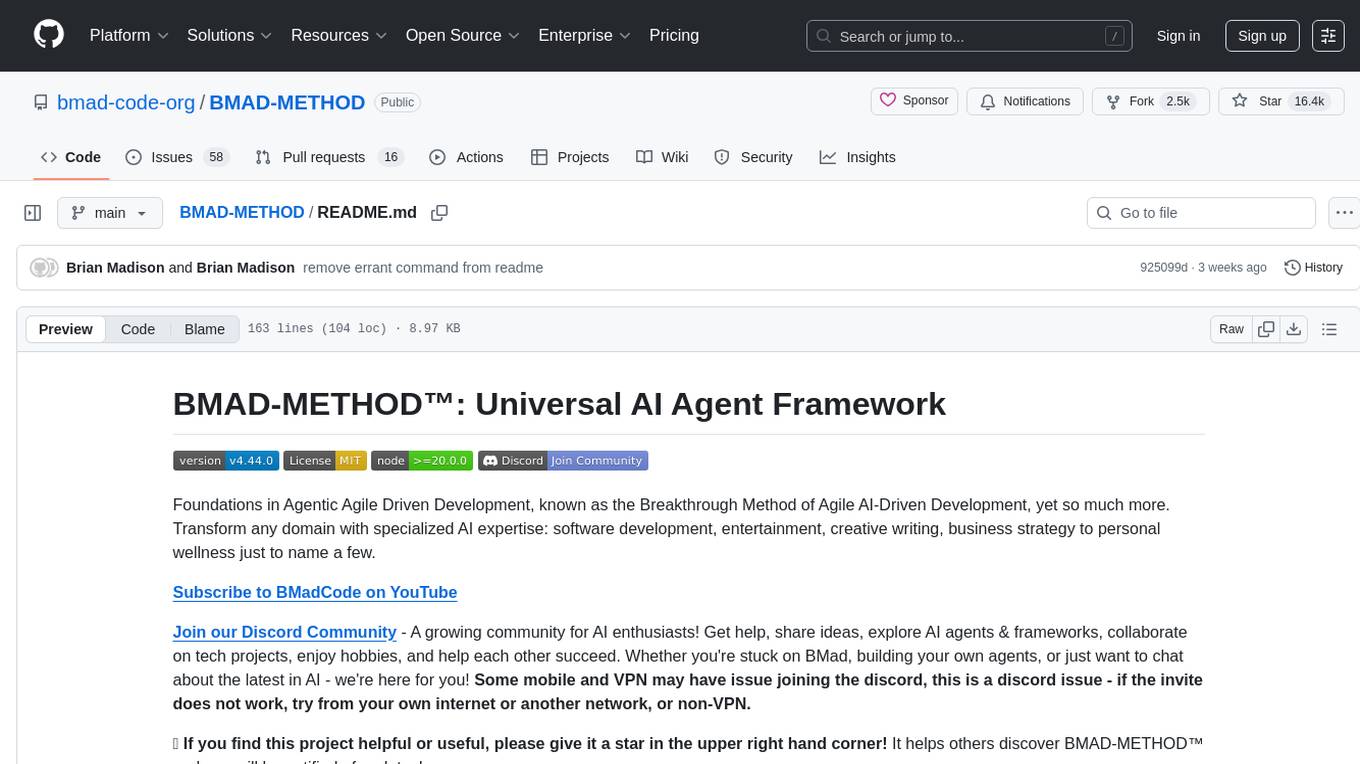
BMAD-METHOD
BMAD-METHOD™ is a universal AI agent framework that revolutionizes Agile AI-Driven Development. It offers specialized AI expertise across various domains, including software development, entertainment, creative writing, business strategy, and personal wellness. The framework introduces two key innovations: Agentic Planning, where dedicated agents collaborate to create detailed specifications, and Context-Engineered Development, which ensures complete understanding and guidance for developers. BMAD-METHOD™ simplifies the development process by eliminating planning inconsistency and context loss, providing a seamless workflow for creating AI agents and expanding functionality through expansion packs.
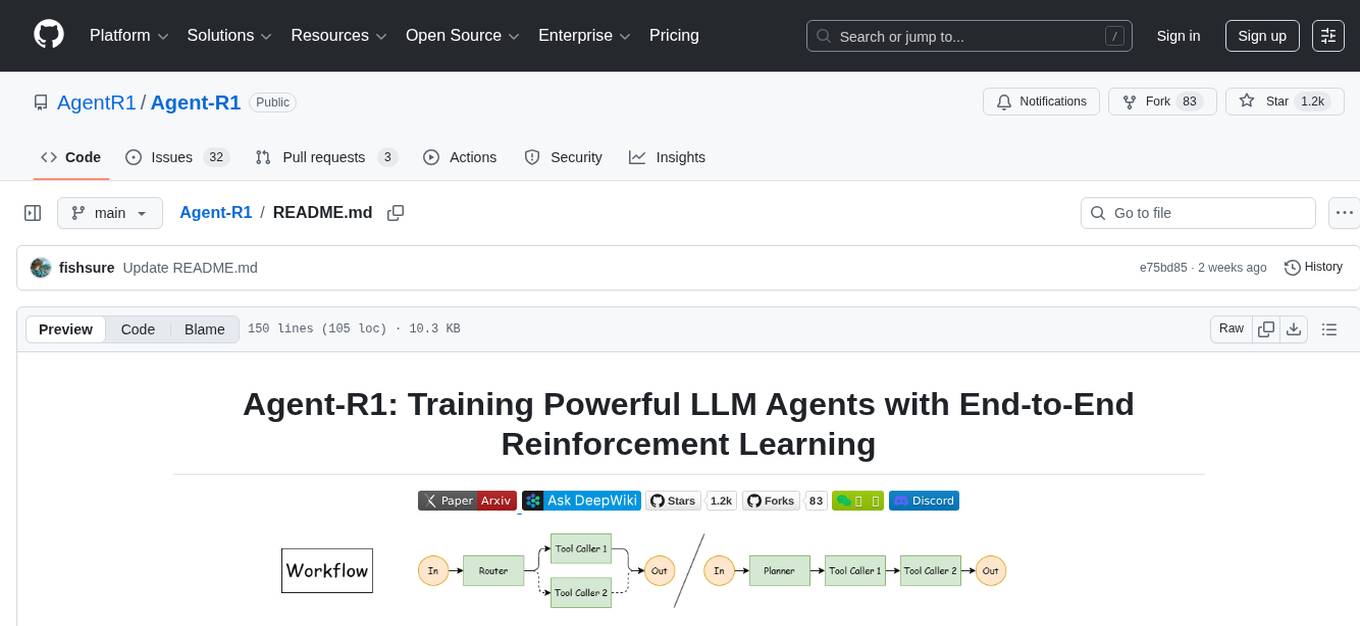
Agent-R1
Agent-R1 is an open-source framework designed to accelerate research and development at the critical intersection of RL and Agent. It employs End-to-End reinforcement learning to train agents in specific environments. Developers define domain-specific tools and reward functions to extend Agent-R1 to unique use cases, eliminating the need for complex workflow engineering. Key features include multi-turn tool calling, multi-tool coordination, process rewards, custom tools and environments, support for multiple RL algorithms, and multi-modal support. It aims to make it easier for researchers and developers to create and explore agents in their own domains, collectively advancing the development of autonomous agents.
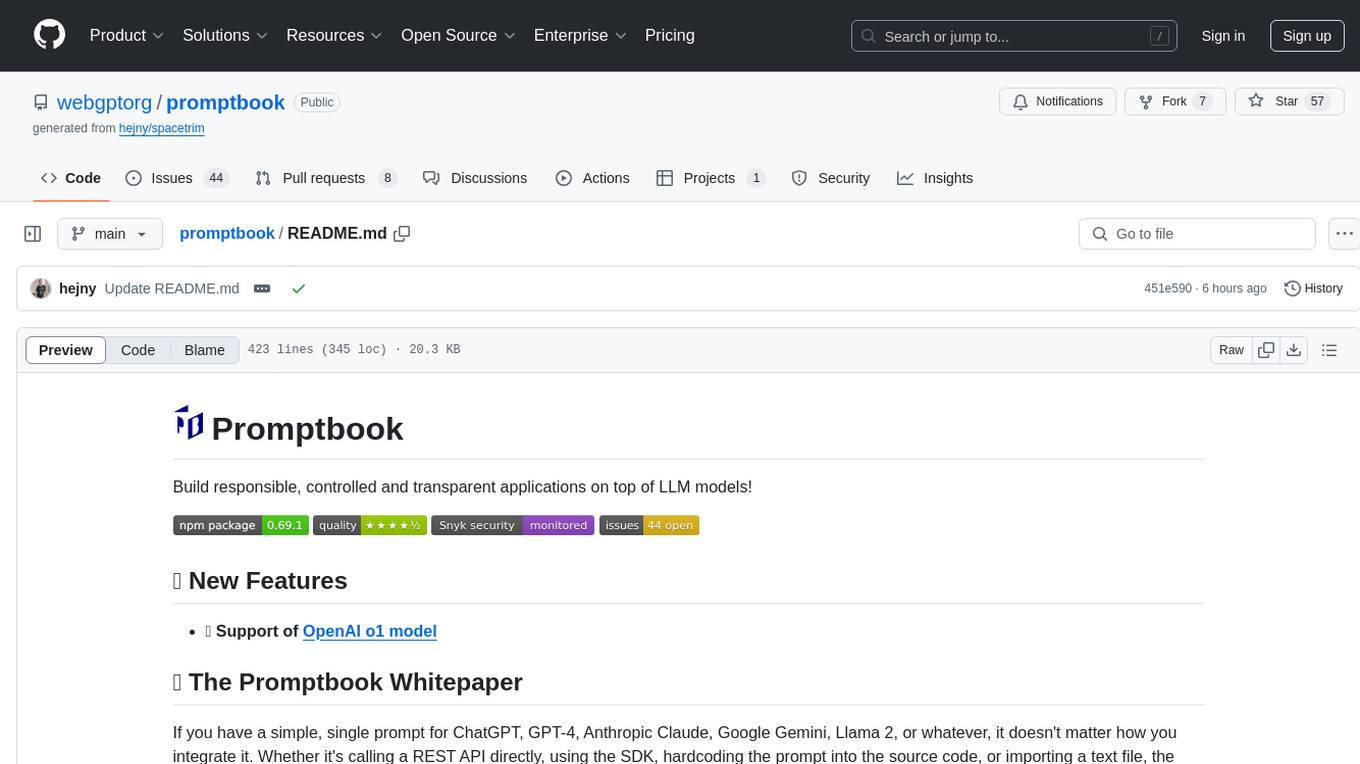
promptbook
Promptbook is a library designed to build responsible, controlled, and transparent applications on top of large language models (LLMs). It helps users overcome limitations of LLMs like hallucinations, off-topic responses, and poor quality output by offering features such as fine-tuning models, prompt-engineering, and orchestrating multiple prompts in a pipeline. The library separates concerns, establishes a common format for prompt business logic, and handles low-level details like model selection and context size. It also provides tools for pipeline execution, caching, fine-tuning, anomaly detection, and versioning. Promptbook supports advanced techniques like Retrieval-Augmented Generation (RAG) and knowledge utilization to enhance output quality.
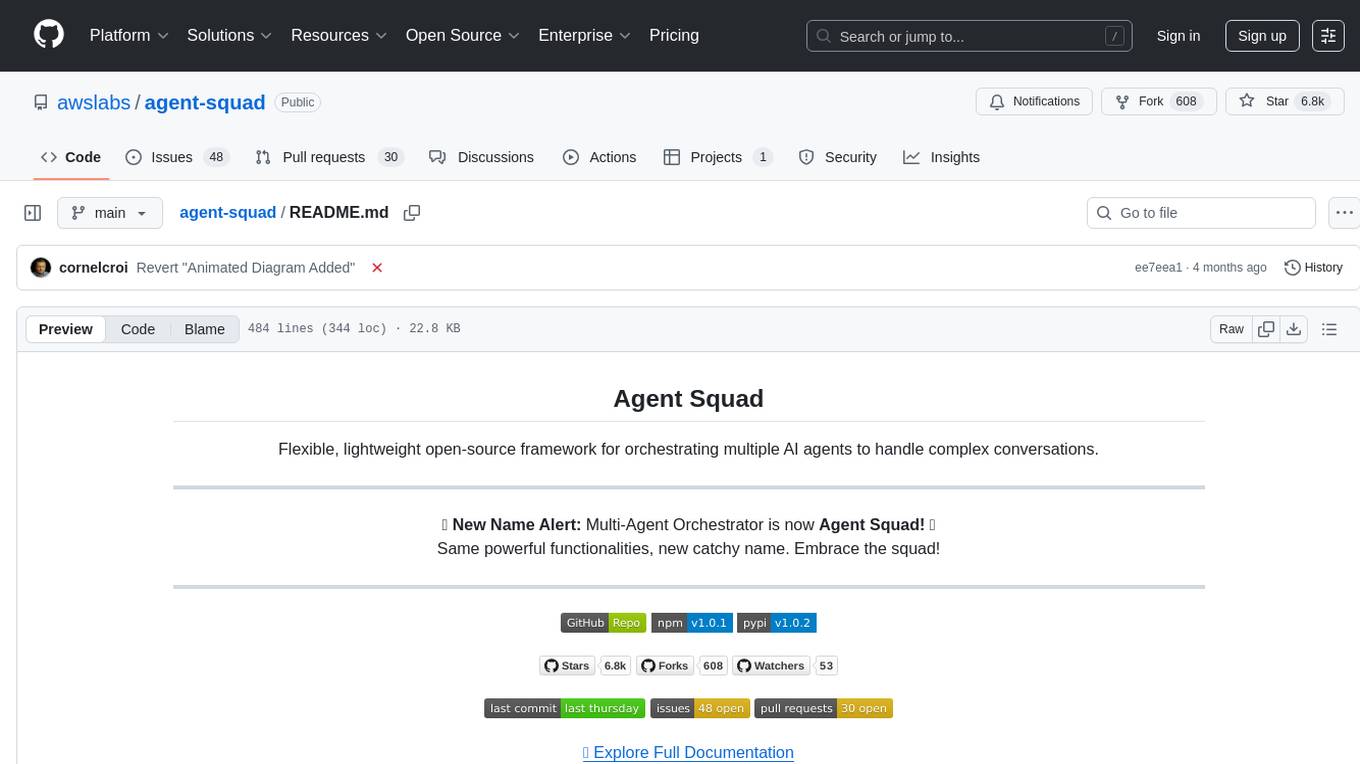
agent-squad
Agent Squad is a flexible, lightweight open-source framework for orchestrating multiple AI agents to handle complex conversations. It intelligently routes queries, maintains context across interactions, and offers pre-built components for quick deployment. The system allows easy integration of custom agents and conversation messages storage solutions, making it suitable for various applications from simple chatbots to sophisticated AI systems, scaling efficiently.
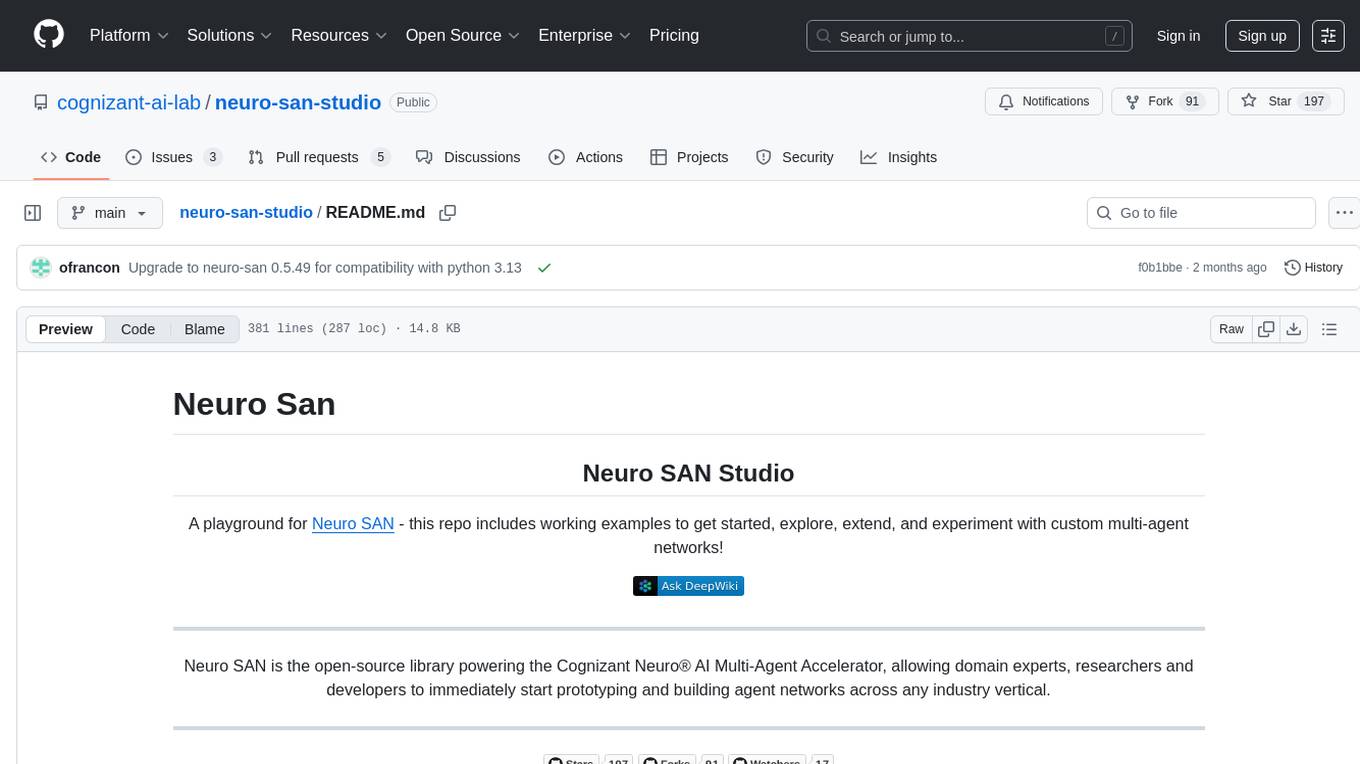
neuro-san-studio
Neuro SAN Studio is an open-source library for building agent networks across various industries. It simplifies the development of collaborative AI systems by enabling users to create sophisticated multi-agent applications using declarative configuration files. The tool offers features like data-driven configuration, adaptive communication protocols, safe data handling, dynamic agent network designer, flexible tool integration, robust traceability, and cloud-agnostic deployment. It has been used in various use-cases such as automated generation of multi-agent configurations, airline policy assistance, banking operations, market analysis in consumer packaged goods, insurance claims processing, intranet knowledge management, retail operations, telco network support, therapy vignette supervision, and more.
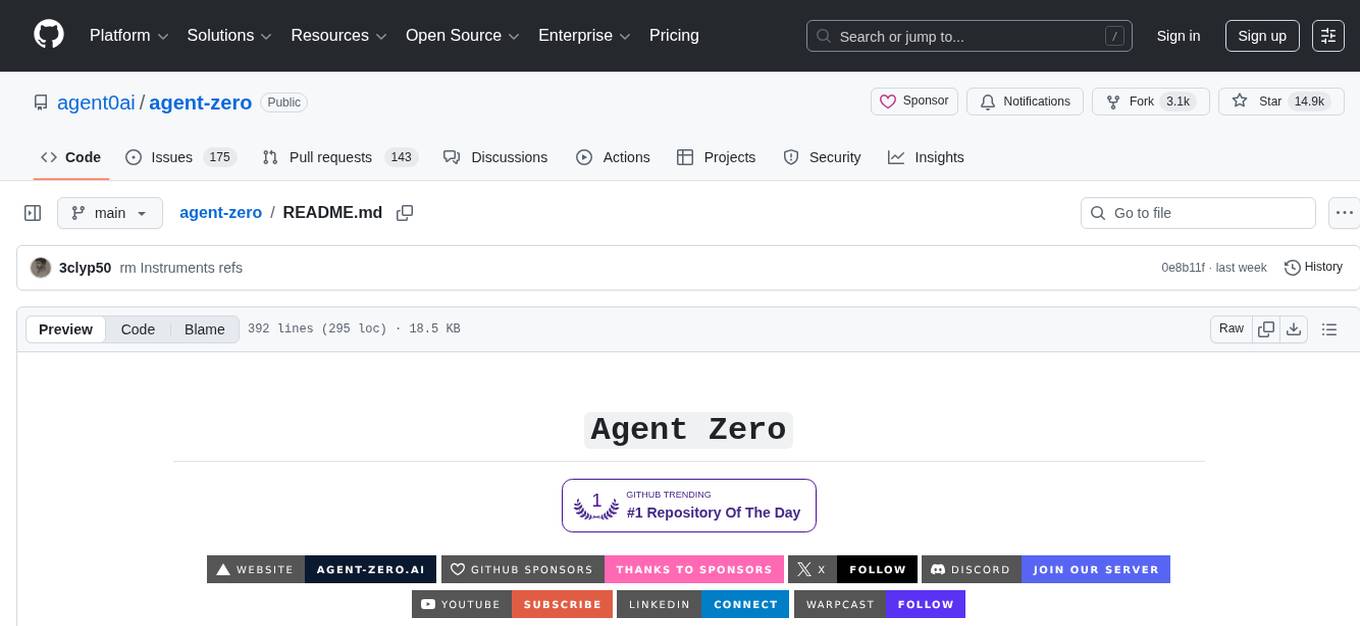
agent-zero
Agent Zero is a personal, organic agentic framework designed to be dynamic, transparent, customizable, and interactive. It uses the computer as a tool to accomplish tasks, with features like general-purpose assistant, computer as a tool, multi-agent cooperation, customizable and extensible framework, and communication skills. The tool is fully Dockerized, with Speech-to-Text and TTS capabilities, and offers real-world use cases like financial analysis, Excel automation, API integration, server monitoring, and project isolation. Agent Zero can be dangerous if not used properly and is prompt-based, guided by the prompts folder. The tool is extensively documented and has a changelog highlighting various updates and improvements.
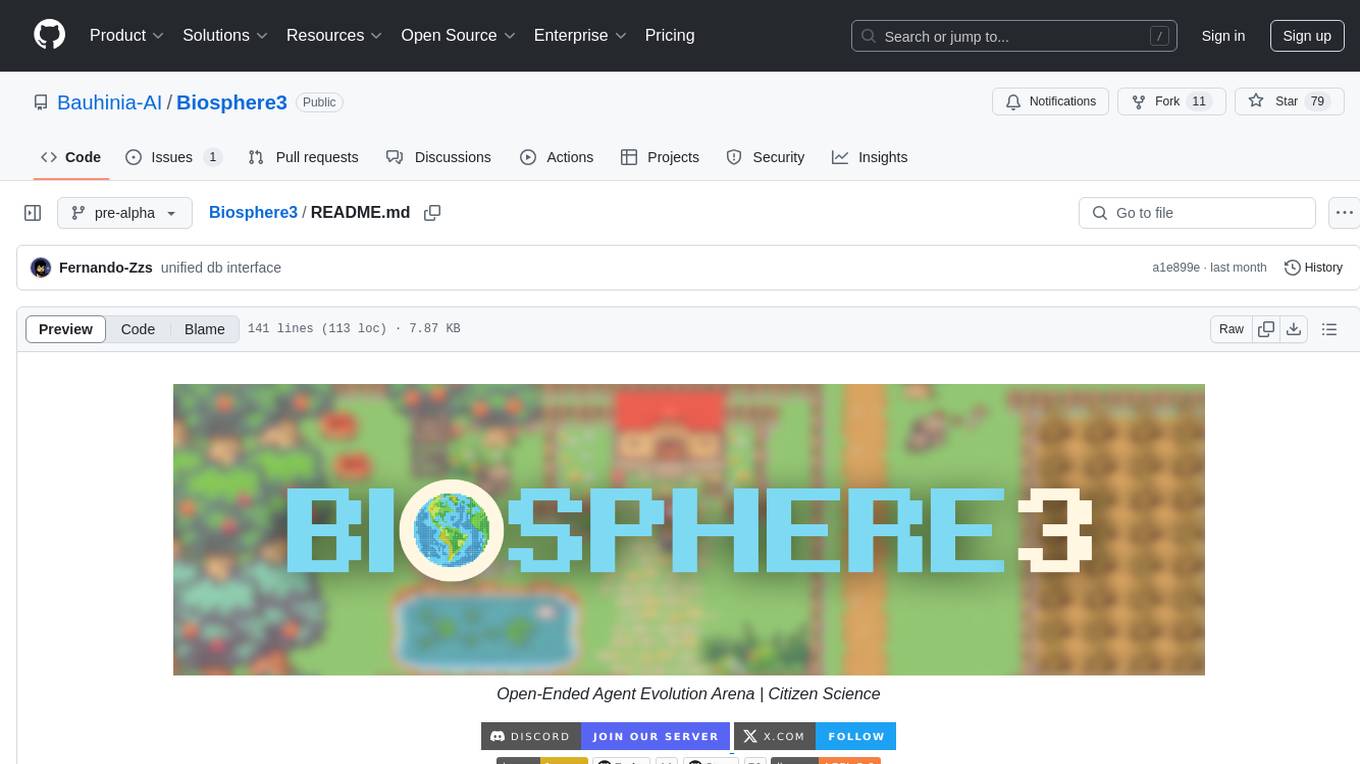
Biosphere3
Biosphere3 is an Open-Ended Agent Evolution Arena and a large-scale multi-agent social simulation experiment. It simulates real-world societies and evolutionary processes within a digital sandbox. The platform aims to optimize architectures for general sovereign AI agents, explore the coexistence of digital lifeforms and humans, and educate the public on intelligent agents and AI technology. Biosphere3 is designed as a Citizen Science Game to engage more intelligent agents and human participants. It offers a dynamic sandbox for agent evaluation, collaborative research, and exploration of human-agent coexistence. The ultimate goal is to establish Digital Lifeform, advancing digital sovereignty and laying the foundation for harmonious coexistence between humans and AI.
For similar tasks

beeai-platform
BeeAI is an open-source platform that simplifies the discovery, running, and sharing of AI agents across different frameworks. It addresses challenges such as framework fragmentation, deployment complexity, and discovery issues by providing a standardized platform for individuals and teams to access agents easily. With features like a centralized agent catalog, framework-agnostic interfaces, containerized agents, and consistent user experiences, BeeAI aims to streamline the process of working with AI agents for both developers and teams.
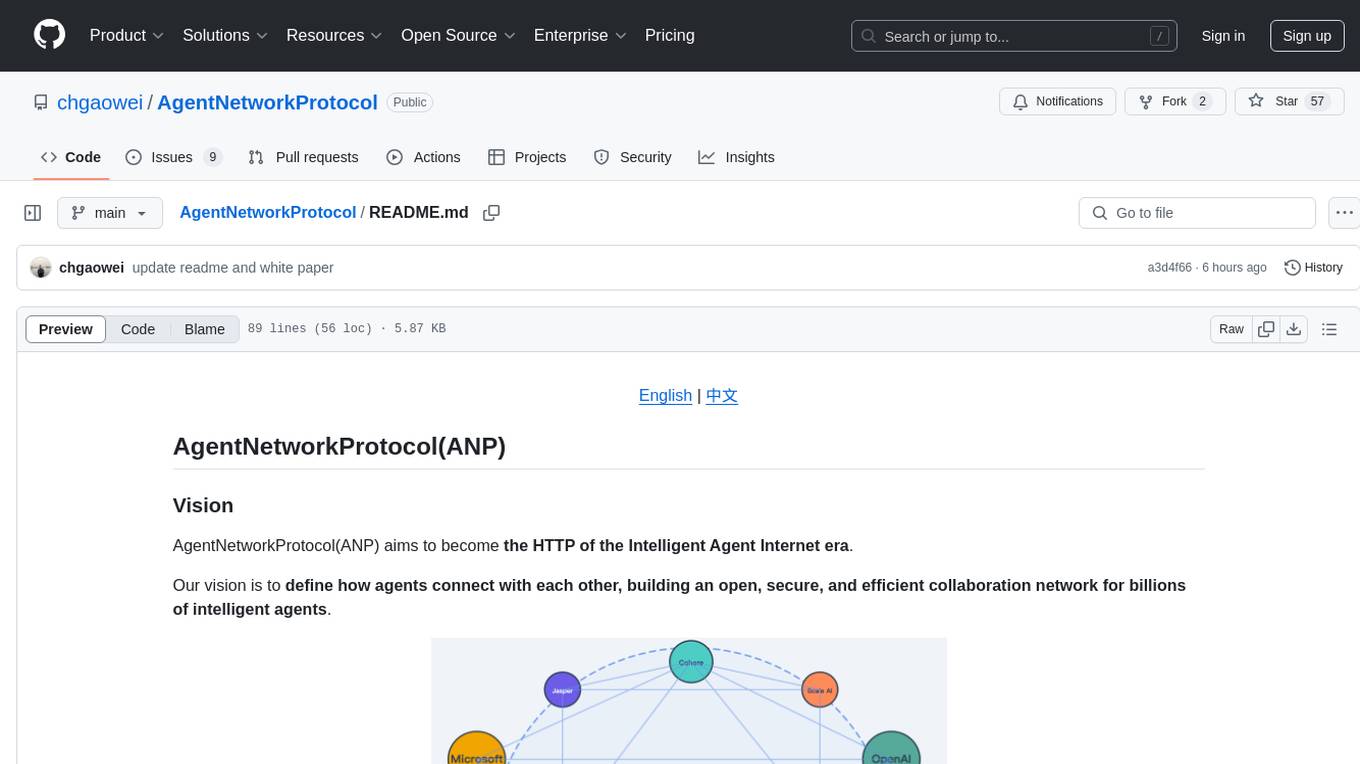
AgentNetworkProtocol
AgentNetworkProtocol (ANP) aims to define how agents connect with each other, building an open, secure, and efficient collaboration network for billions of intelligent agents. It addresses challenges in interconnectivity, native interfaces, and efficient collaboration by providing protocol layers for identity and encrypted communication, meta-protocol negotiation, and application protocol management. The project is developing an open-source implementation available on GitHub, with a vision to become the HTTP of the Intelligent Agent Internet era and establish ANP as an industry standard through a standardization committee. Contact the author Gaowei Chang via email, Discord, website, or GitHub for contributions or inquiries.

beeai
BeeAI is an open platform that helps users discover, run, and compose AI agents from any framework and language. It offers a framework-agnostic approach, allowing seamless integration of AI agents regardless of the language or platform. Users can build complex workflows using simple building blocks, explore a catalog of powerful agents with integrated search, and benefit from the BeeAI ecosystem with first-class support for Python and TypeScript agent developers.
avatar
AvaTaR is a novel and automatic framework that optimizes an LLM agent to effectively use provided tools and improve performance on a given task/domain. It designs a comparator module to provide insightful prompts to the LLM agent via reasoning between positive and negative examples from training data.
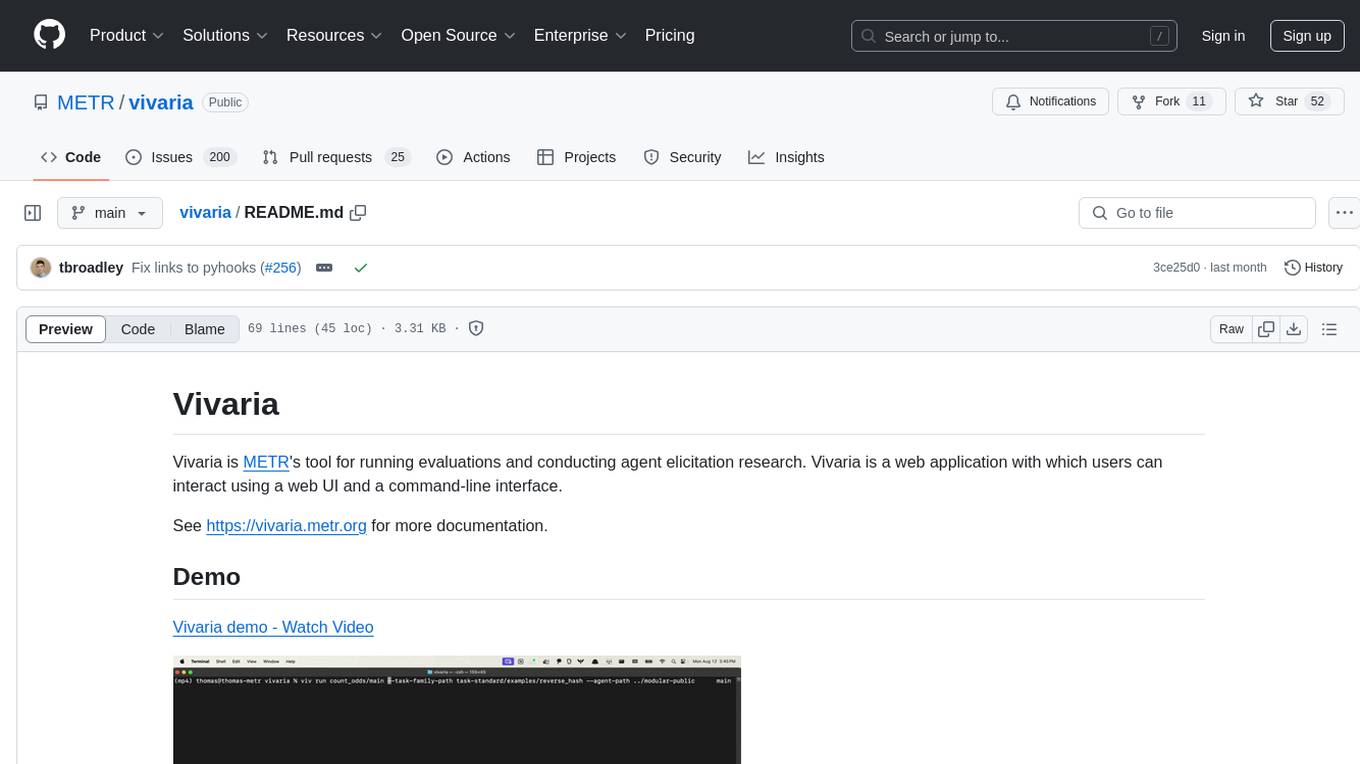
vivaria
Vivaria is a web application tool designed for running evaluations and conducting agent elicitation research. Users can interact with Vivaria using a web UI and a command-line interface. It allows users to start task environments based on METR Task Standard definitions, run AI agents, perform agent elicitation research, view API requests and responses, add tags and comments to runs, store results in a PostgreSQL database, sync data to Airtable, test prompts against LLMs, and authenticate using Auth0.
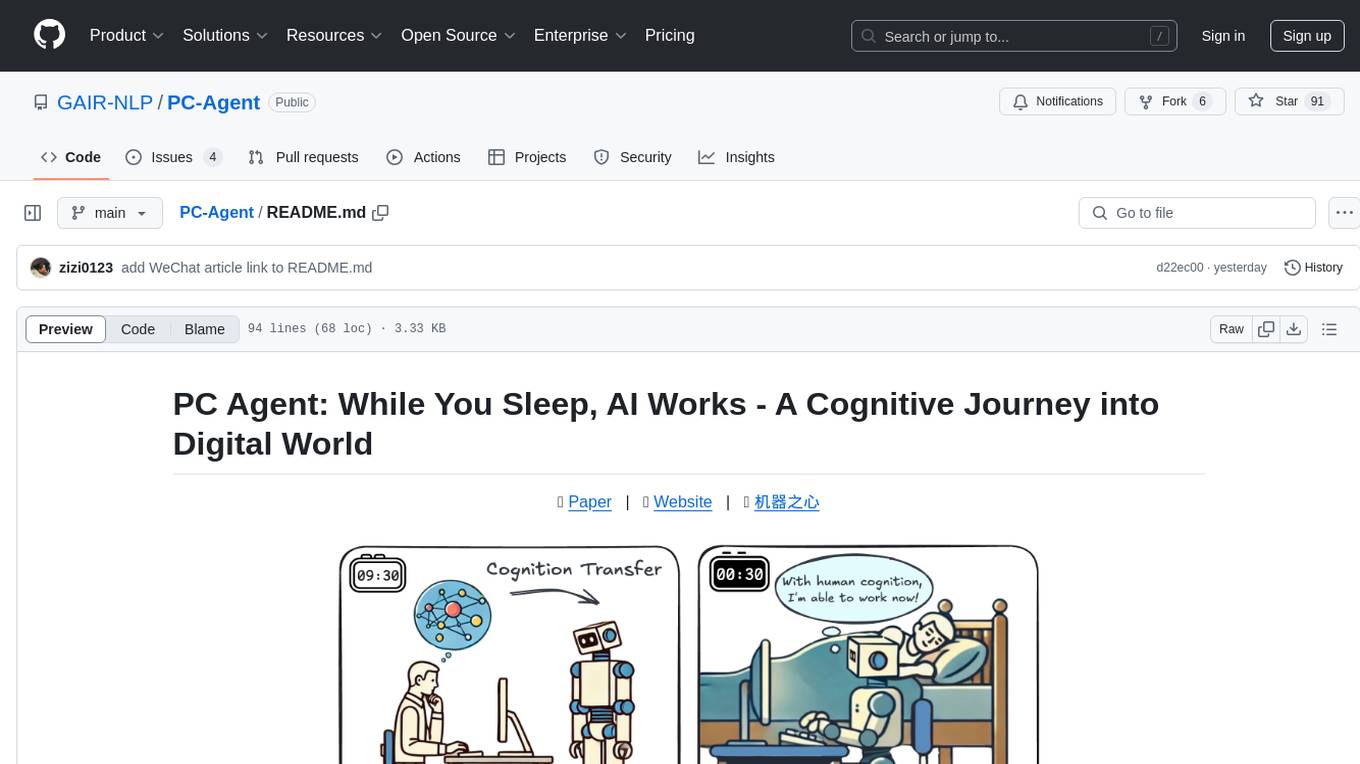
PC-Agent
PC Agent introduces a novel framework to empower autonomous digital agents through human cognition transfer. It consists of PC Tracker for data collection, Cognition Completion for transforming raw data, and a multi-agent system for decision-making and visual grounding. Users can set up the tool in Python environment, customize data collection with PC Tracker, process data into cognitive trajectories, and run the multi-agent system. The tool aims to enable AI to work autonomously while users sleep, providing a cognitive journey into the digital world.
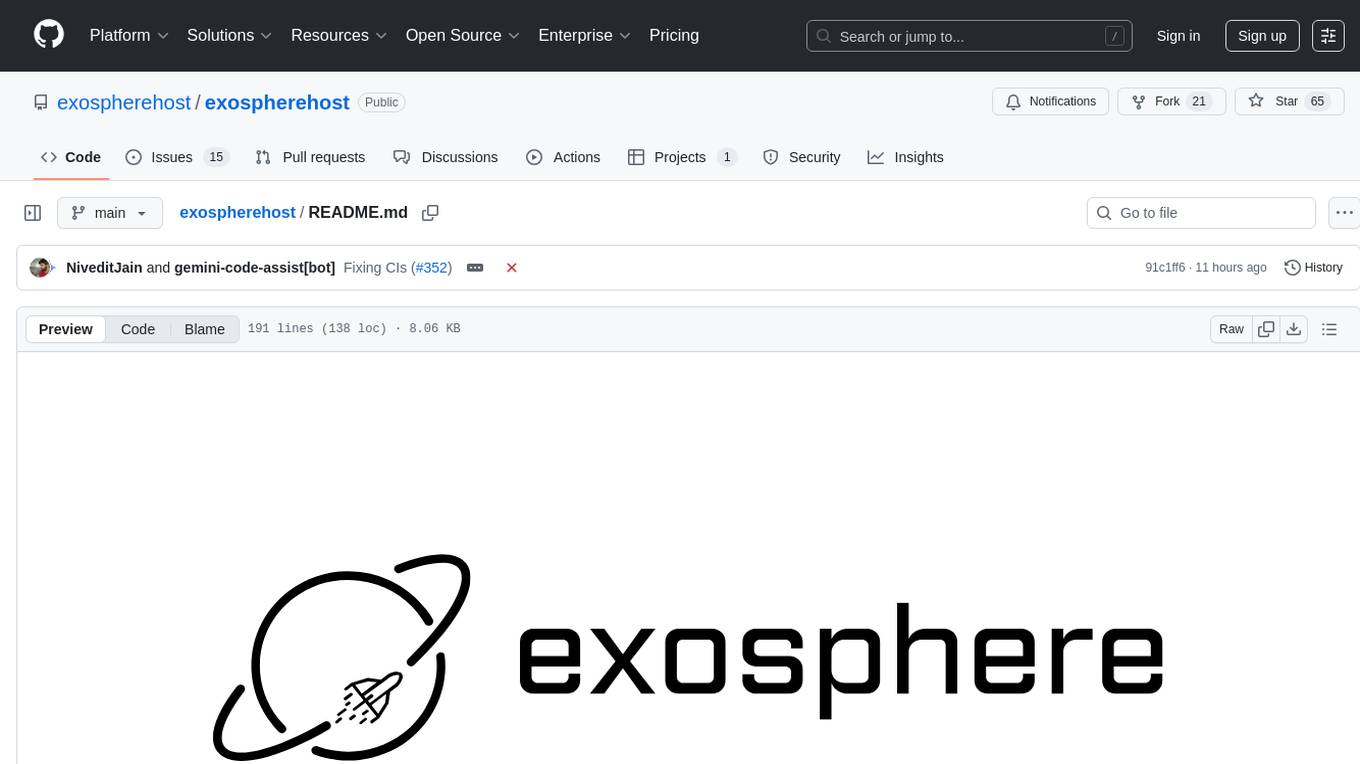
exospherehost
Exosphere is an open source infrastructure designed to run AI agents at scale for large data and long running flows. It allows developers to define plug and playable nodes that can be run on a reliable backbone in the form of a workflow, with features like dynamic state creation at runtime, infinite parallel agents, persistent state management, and failure handling. This enables the deployment of production agents that can scale beautifully to build robust autonomous AI workflows.
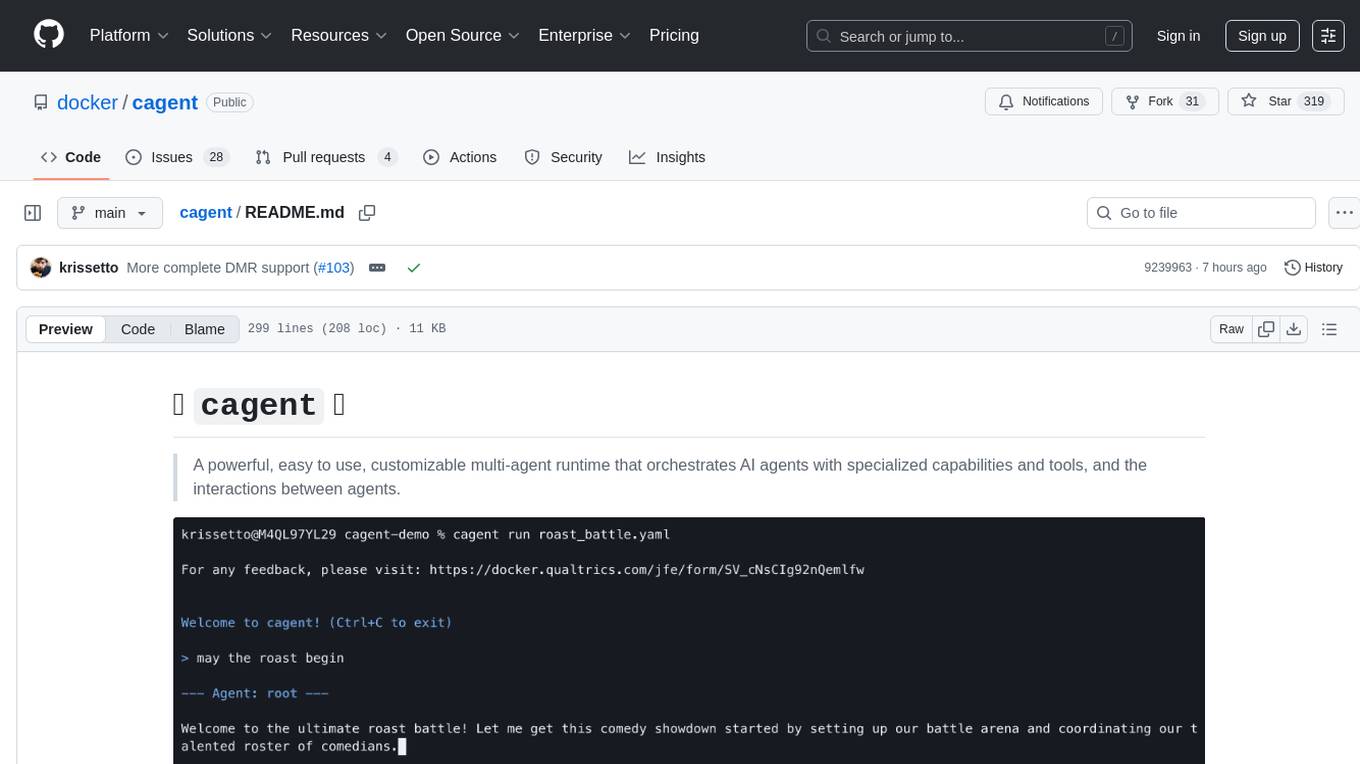
cagent
cagent is a powerful and easy-to-use multi-agent runtime that orchestrates AI agents with specialized capabilities and tools, allowing users to quickly build, share, and run a team of virtual experts to solve complex problems. It supports creating agents with YAML configuration, improving agents with MCP servers, and delegating tasks to specialists. Key features include multi-agent architecture, rich tool ecosystem, smart delegation, YAML configuration, advanced reasoning tools, and support for multiple AI providers like OpenAI, Anthropic, Gemini, and Docker Model Runner.
For similar jobs

sweep
Sweep is an AI junior developer that turns bugs and feature requests into code changes. It automatically handles developer experience improvements like adding type hints and improving test coverage.

teams-ai
The Teams AI Library is a software development kit (SDK) that helps developers create bots that can interact with Teams and Microsoft 365 applications. It is built on top of the Bot Framework SDK and simplifies the process of developing bots that interact with Teams' artificial intelligence capabilities. The SDK is available for JavaScript/TypeScript, .NET, and Python.

ai-guide
This guide is dedicated to Large Language Models (LLMs) that you can run on your home computer. It assumes your PC is a lower-end, non-gaming setup.

classifai
Supercharge WordPress Content Workflows and Engagement with Artificial Intelligence. Tap into leading cloud-based services like OpenAI, Microsoft Azure AI, Google Gemini and IBM Watson to augment your WordPress-powered websites. Publish content faster while improving SEO performance and increasing audience engagement. ClassifAI integrates Artificial Intelligence and Machine Learning technologies to lighten your workload and eliminate tedious tasks, giving you more time to create original content that matters.

chatbot-ui
Chatbot UI is an open-source AI chat app that allows users to create and deploy their own AI chatbots. It is easy to use and can be customized to fit any need. Chatbot UI is perfect for businesses, developers, and anyone who wants to create a chatbot.

BricksLLM
BricksLLM is a cloud native AI gateway written in Go. Currently, it provides native support for OpenAI, Anthropic, Azure OpenAI and vLLM. BricksLLM aims to provide enterprise level infrastructure that can power any LLM production use cases. Here are some use cases for BricksLLM: * Set LLM usage limits for users on different pricing tiers * Track LLM usage on a per user and per organization basis * Block or redact requests containing PIIs * Improve LLM reliability with failovers, retries and caching * Distribute API keys with rate limits and cost limits for internal development/production use cases * Distribute API keys with rate limits and cost limits for students

uAgents
uAgents is a Python library developed by Fetch.ai that allows for the creation of autonomous AI agents. These agents can perform various tasks on a schedule or take action on various events. uAgents are easy to create and manage, and they are connected to a fast-growing network of other uAgents. They are also secure, with cryptographically secured messages and wallets.

griptape
Griptape is a modular Python framework for building AI-powered applications that securely connect to your enterprise data and APIs. It offers developers the ability to maintain control and flexibility at every step. Griptape's core components include Structures (Agents, Pipelines, and Workflows), Tasks, Tools, Memory (Conversation Memory, Task Memory, and Meta Memory), Drivers (Prompt and Embedding Drivers, Vector Store Drivers, Image Generation Drivers, Image Query Drivers, SQL Drivers, Web Scraper Drivers, and Conversation Memory Drivers), Engines (Query Engines, Extraction Engines, Summary Engines, Image Generation Engines, and Image Query Engines), and additional components (Rulesets, Loaders, Artifacts, Chunkers, and Tokenizers). Griptape enables developers to create AI-powered applications with ease and efficiency.



